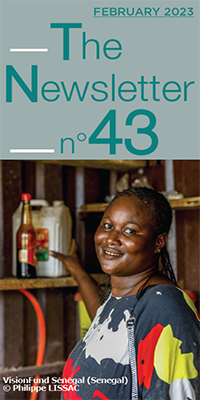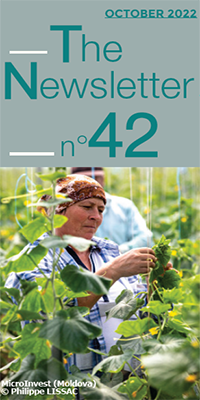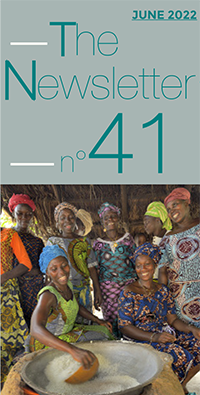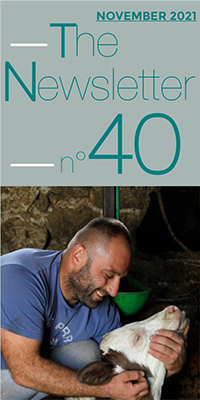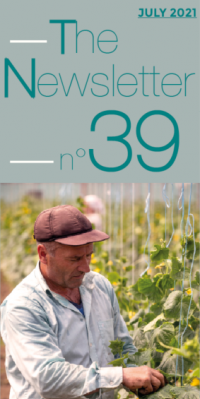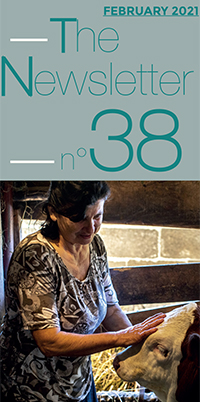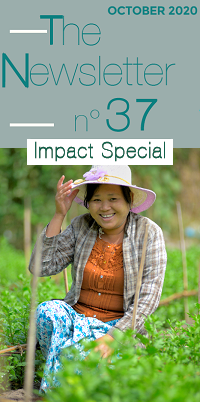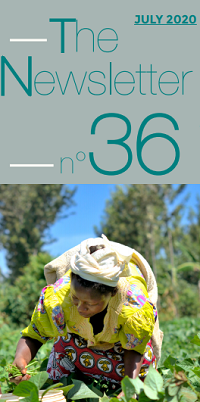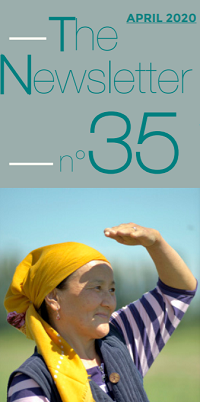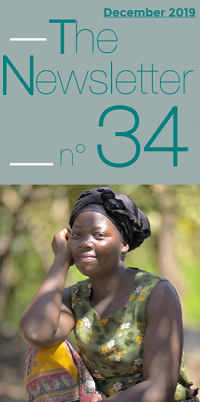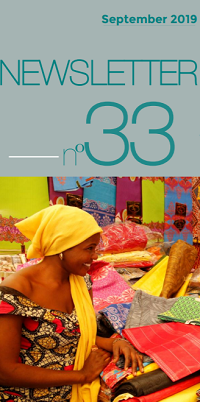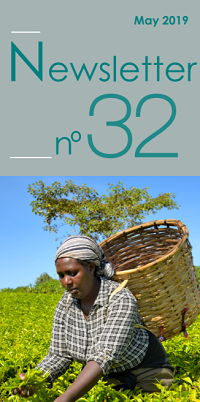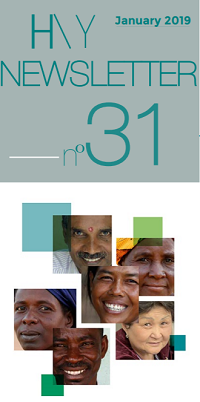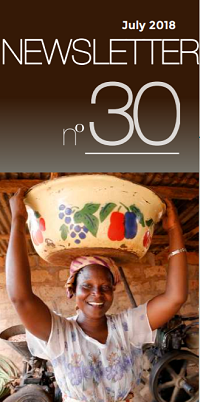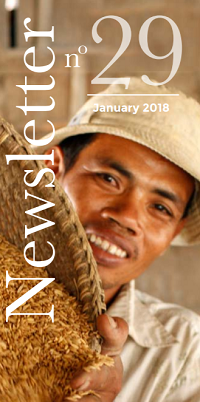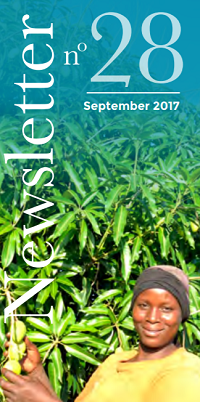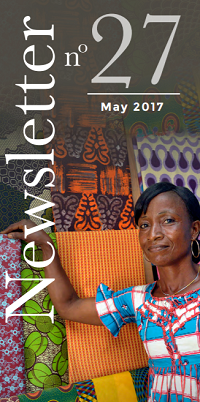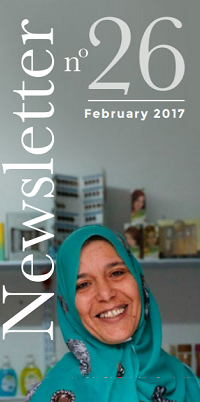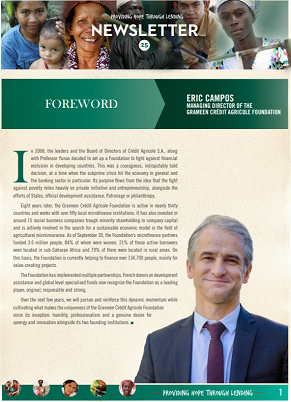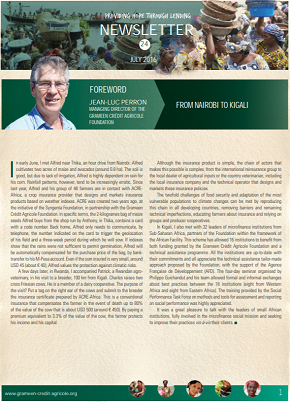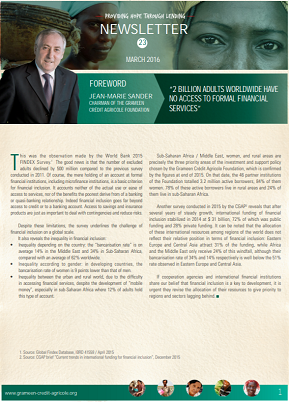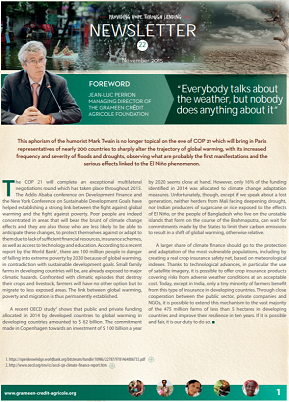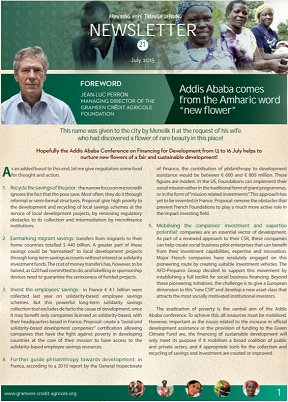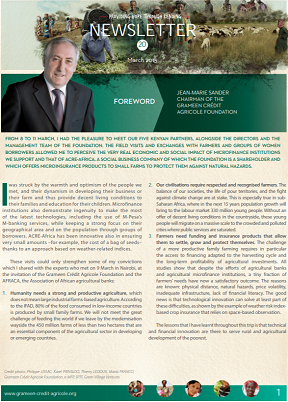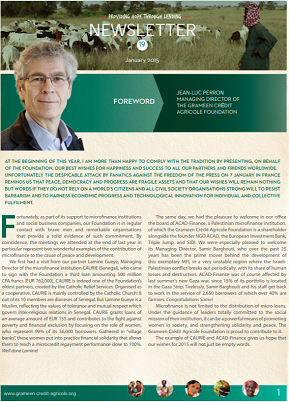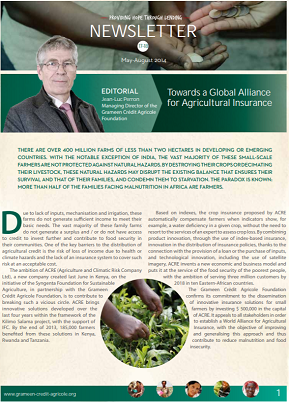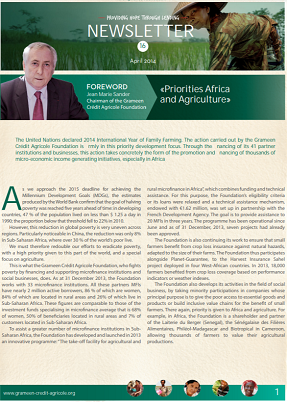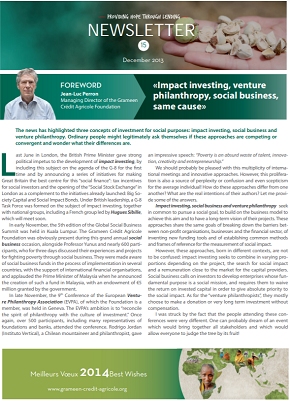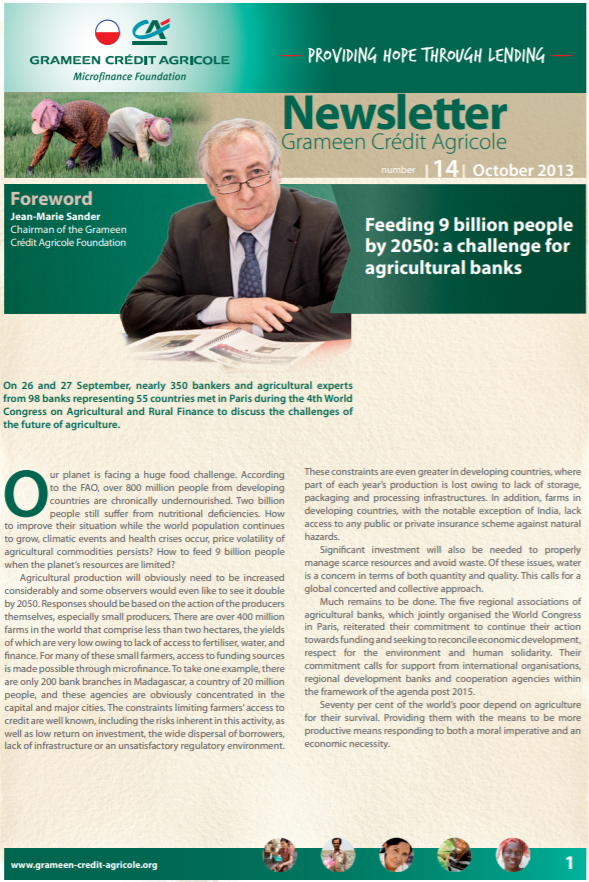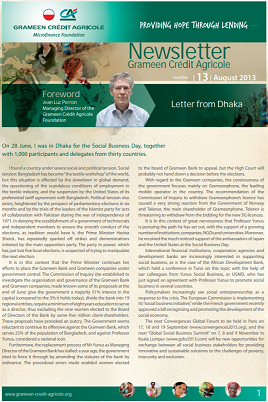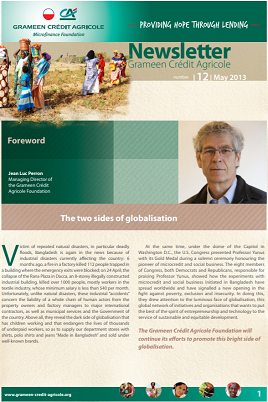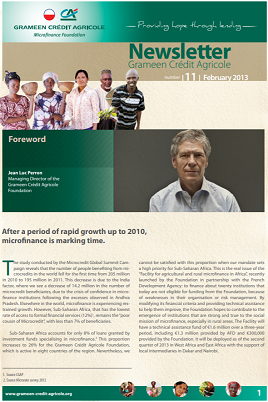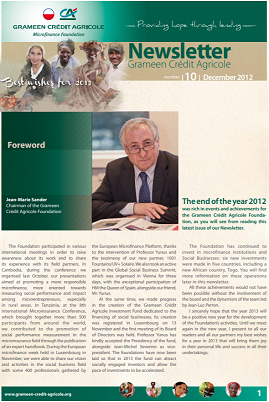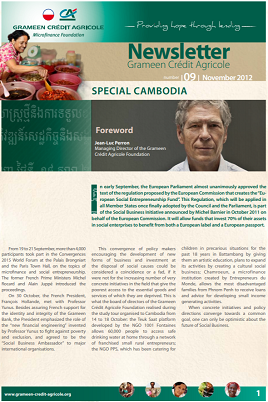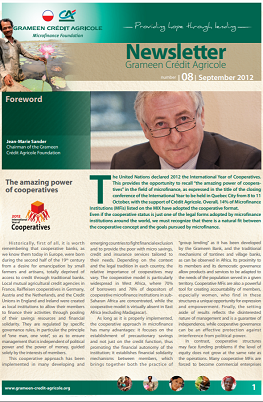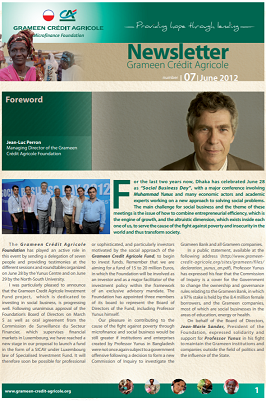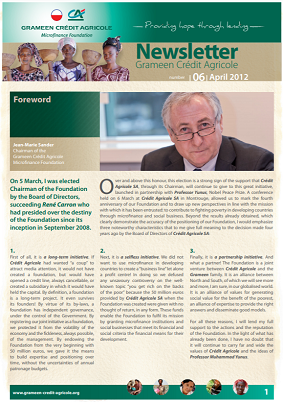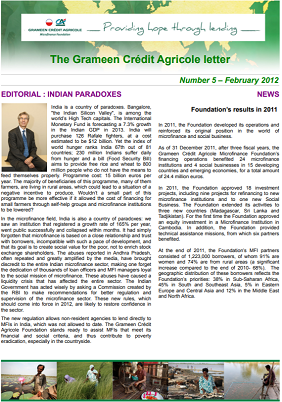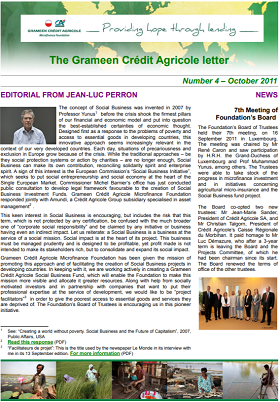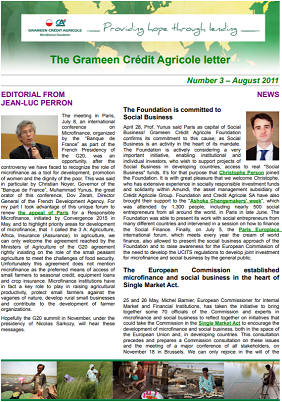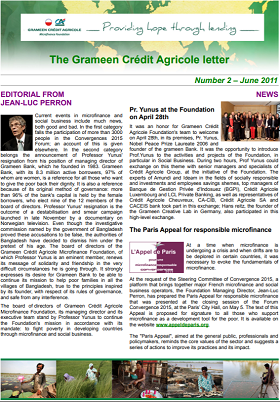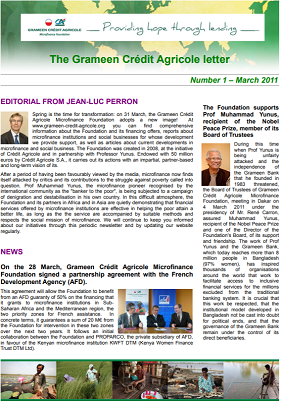Publications
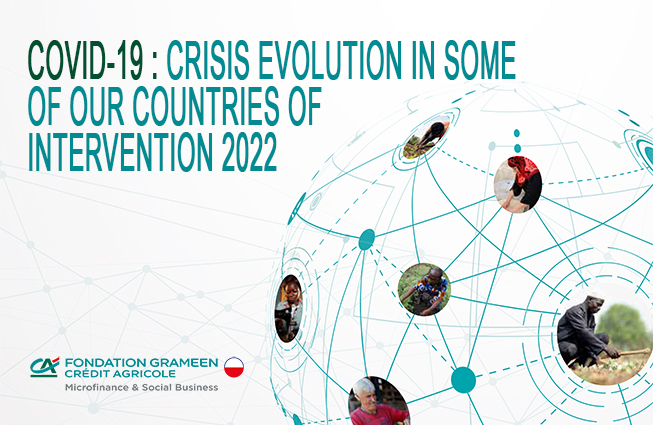
Covid-19: Crisis evolution in some of our countries of intervention
Since the beginning of the pandemic, the Grameen Crédit Agricole Foundation has been monitoring the evolution of the health crisis in its countries of intervention to better understand its effects on supported microfinance institutions and their clients. After Covid-19: the impact of the crisis on microfinance, this new publication compiles data and analyses from some of the countries where the Foundation works. The Foundation has chosen to use accessible, quantitative and qualitative measurement tools.
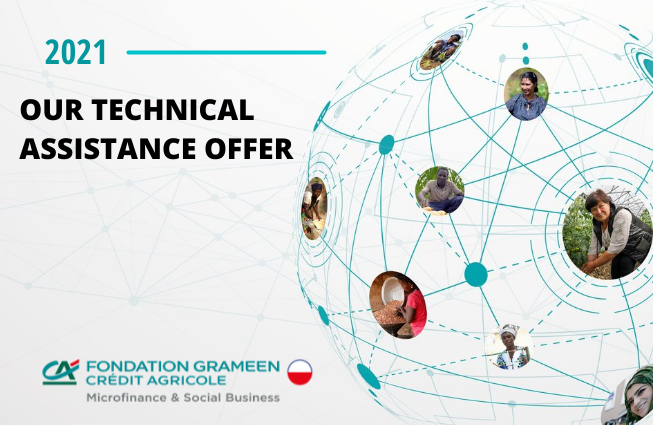
Our technical assistance offer
In 2020, with the methodological help of Cerise, an independent organisation, we decided to conduct an in-depth evaluation of our technical assistance: internal procedures, intervention methods, involvment of beneficiary organisations, choice of the provider, reporting, post-mission monitoring, etc.
Through this document, we report on this work by sharing our experience with all those who contribute to the consolidation of the inclusive finance sector.
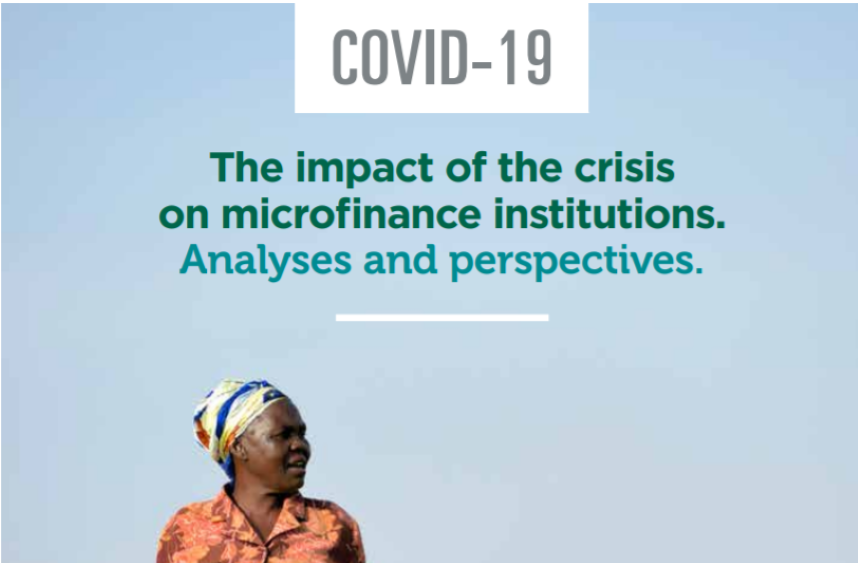
The impact of the crisis on microfinance institutions
The Covid-19 pandemic affected all economies impacting fragile economies and the most vulnerable populations in particular. The Grameen Crédit Agricole Foundation together with Inpulse and ADA began to investigate the unprecedented effects of this global crisis on microfinance institutions.
Discover through this report the results of these studies.
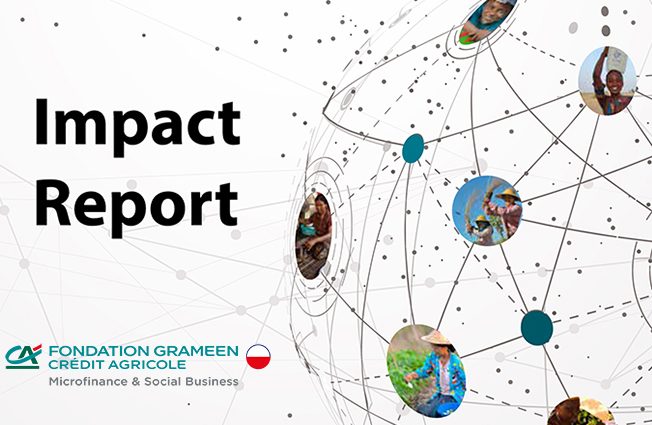
Grameen Crédit Agricole Foundation publishes its 1st Impact Report
In order to give more insight to and share the results of its action, the Grameen Crédit Agricole Foundation is publishing its first Impact Report, a financial and extra-financial assessment based on 2019 activity data. The impact assessment was carried out with CERISE, an independent firm specializing in impact and social performance measurement. The purpose of this report is to provide a concise and objective overview of the Foundation’s contribution and its forms of action in favour of impact entrepreneurship and access to essential services.
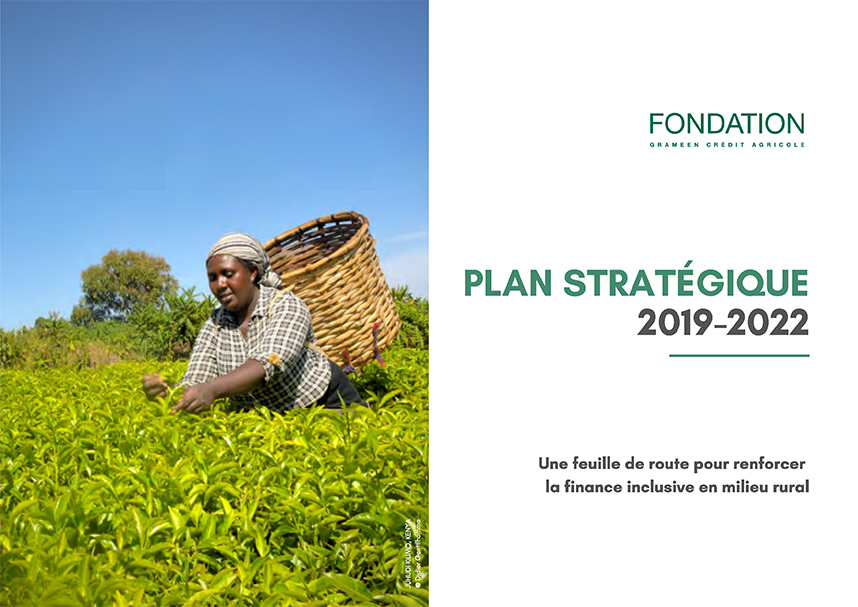
Strategic Plan 2019/22
The Grameen Crédit Agricole Foundation's 2019-2022 Strategic Plan anchors its positioning around three priority areas: consolidating its expertise and offering in microfinance, strengthening the resilience of rural economies and promoting social impact in the financial sector. The three proposed axes are based on the Foundation's strengths and strategic axes aimed at strengthening its positioning, increasing its impact and balancing its business model.

Taking the Floor : Advocacy for a more inclusive and sustainable économy 2018-2019
To promote good practices and contribute to the advocacy of the sector, the Foundation shares its experience through various publications, organises events and exchanges with other key players in the field of inclusive finance. This is why the Foundation has decided to share its main leading articles published since 2018 in this new publication "Taking the floor: Advocacy for a more inclusive and sustainable economy".

Solidarity Bankers by CA 2018-2020
Launched by the Grameen Crédit Agricole Foundation and Crédit Agricole SA, Solidarity Bankers is a skill-based voluntary programme for employees of the Crédit Agricole Group in favour of organizations supported by the Foundation. The Solidarity Bankers missions covered several themes between 2018 and 2020. The list presented here is not exhaustive but covers every one of these subjects.
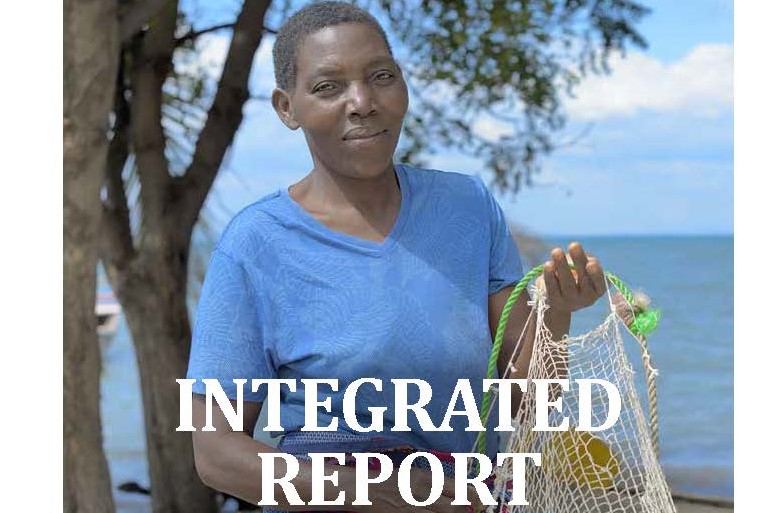
2023 Annual Report
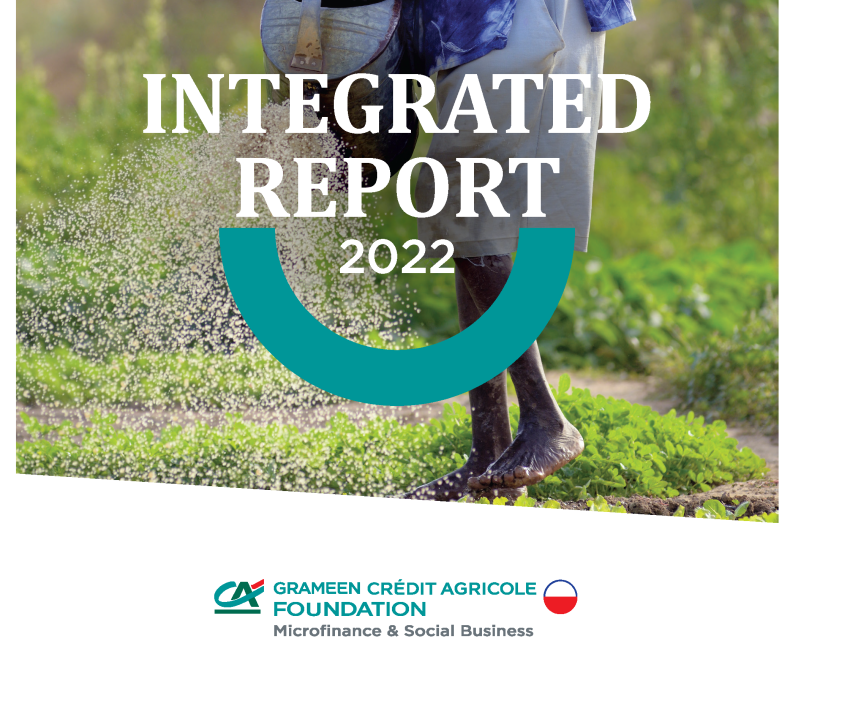
2022 Annual Report
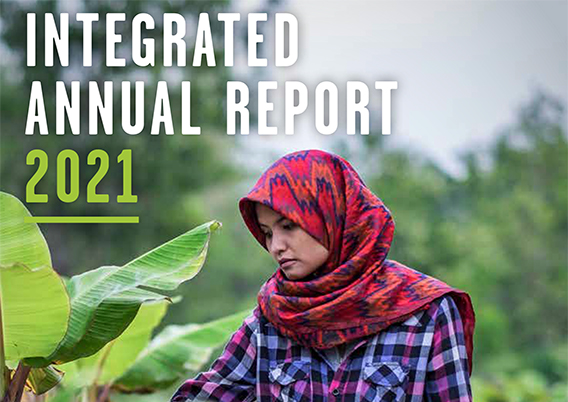
2021 Annual Report
In 2021, we thought we would emerge from the effects of the health crisis. In this context, our partners have once again demonstrated their resilience. Thanks to digitalization, coordination between stakeholders and their capacity to innovate, microfinance institutions and social enterprises have been able to resist and strengthen themselves while the Foundation once again demonstrated the usefulness of its activity by supporting 81 partners in 37 countries around the world.
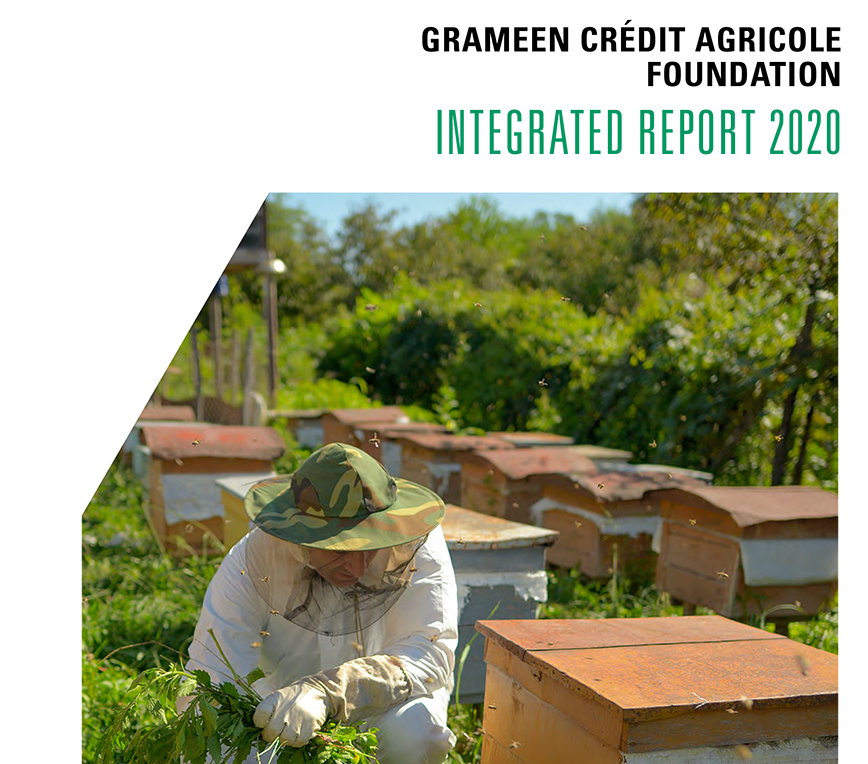
2020 Annual Report
The crisis linked to the Covid-19 health situation has been the most brutal we have gone through since the creation of the Grameen Crédit Agricole Foundation. It has tested our fundamentals and forced us to adapt in record time. But this exceptional year has also enabled the Foundation to illustrate its special place at the heart of the microfinance and impact entrepreneurship sector.
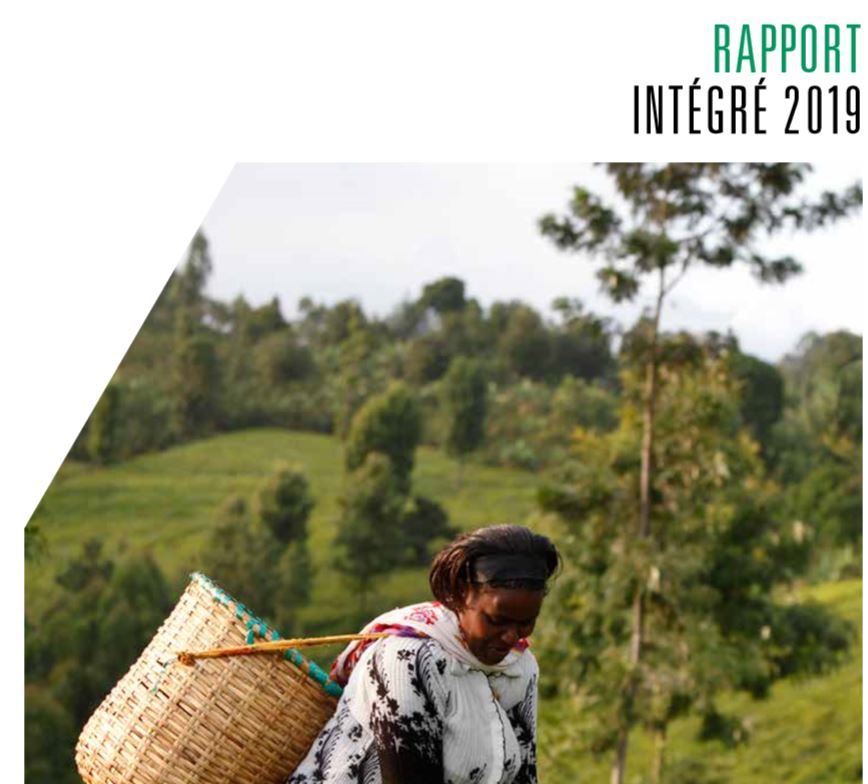
2019 Annual Report
In its 2019 Integrated Annual Report, the Foundation presents the highlights and key figures of the past year. The report goes back to the programmes developed with the Crédit Agricole entities, the implementation of several projects with institutional and technical partners, the main activities and the financing provided during the year. It has, once again, experienced dynamic growth and reaffirmed its position as a lever for the Crédit Agricole Group to promote inclusive finance.
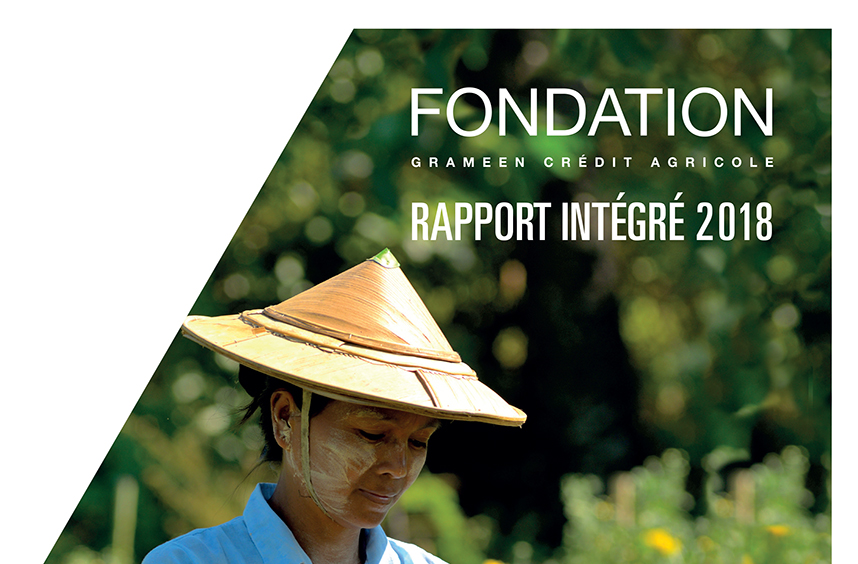
2018 Annual Report
The Grameen Crédit Agricole Foundation's Integrated Report 2018 describes the highlights, key figures and projects developed by the Foundation with its partners over the past year. This year was an important year, marked in particular by the Foundation's 10th anniversary. During this decade, the Foundation succeeded in positioning itself as a recognised player in the inclusive finance sector and strengthened its action in the fight against poverty.
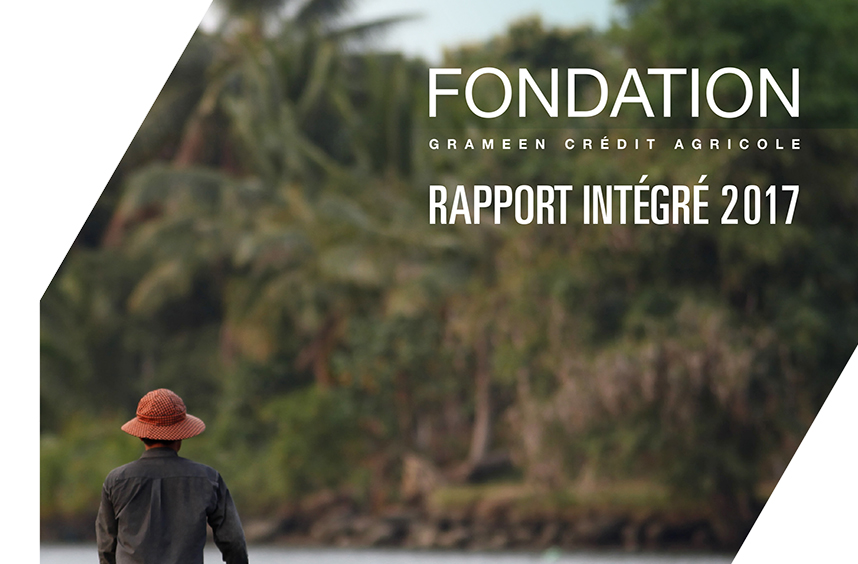
2017 Annual Report
Every day, the idea of responsible finance is growing. The ambition of a better shared, more accessible economy is not wishful thinking but becomes a concrete commitment, a movement in action. A specialist in rural microfinance and socially responsible investments, the Grameen Crédit Agricole Foundation is carrying its share of what promises to be a major financial transition today.
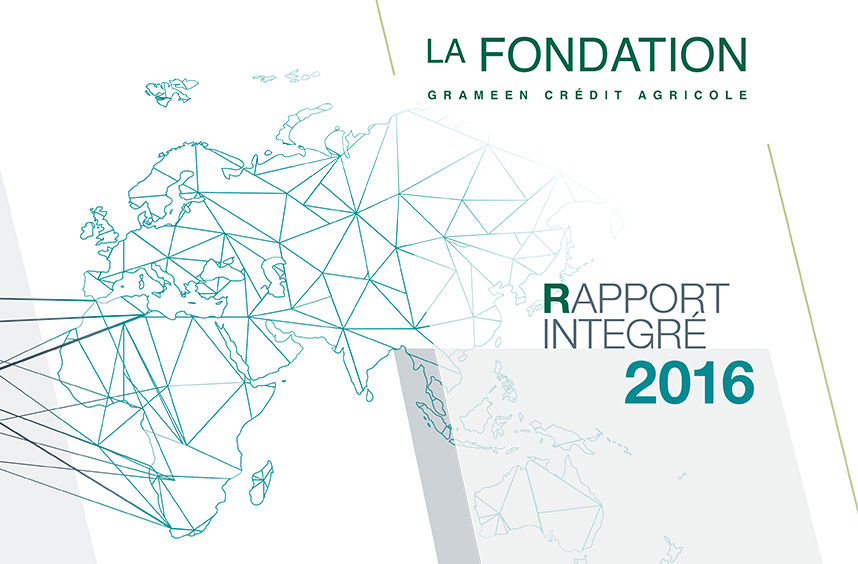
2016 Annual Report
Finance is inclusive when it works for the common good by promoting regional development, social integration, sustainable development, protection of client interests, economic development creating jobs and value, as well as innovation and entrepreneurship.
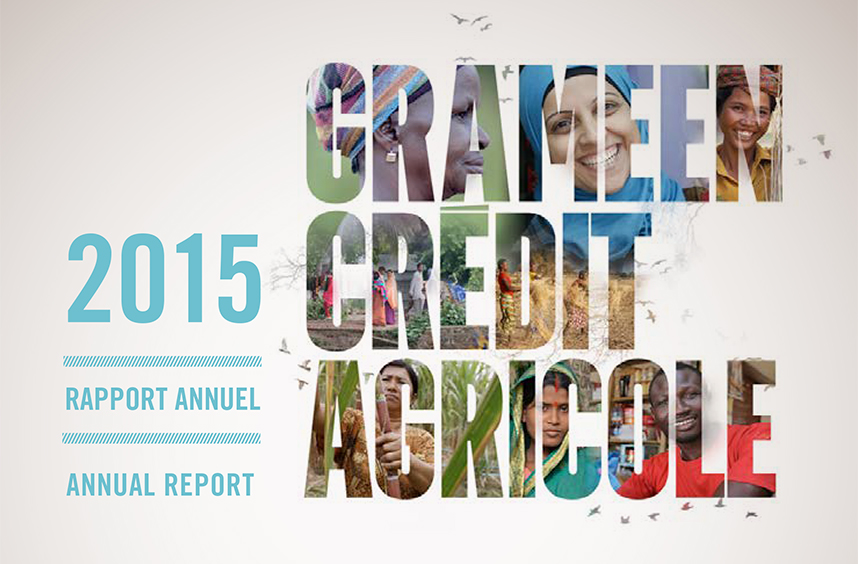
2015 Annual Report
2015 has kept its promises: in September, the United Nations General Assembly approved the 17 Sustainable Development Goals which constitute the new roadmap for governments, international organizations, businesses and civil society to eradicate poverty and malnutrition by 2030; in December COP 21 adopted by consensus the Paris Agreement which fixes the commitments of States to keep global warming well below 2°.
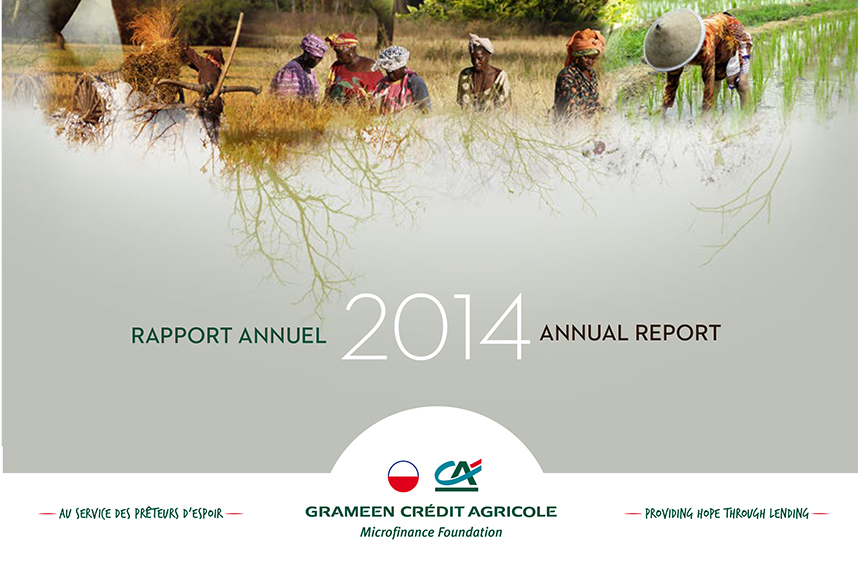
2014 Annual Report
The 2014 World Bank Findex report1 reveals that 2 billion adults worldwide remain without access to formal financial services, be it credit, savings, insurance or payment. that this figure is down sharply by 20% compared to that of the similar survey carried out in 2011, it shows the extent of the financial exclusion which mainly strikes developing countries.
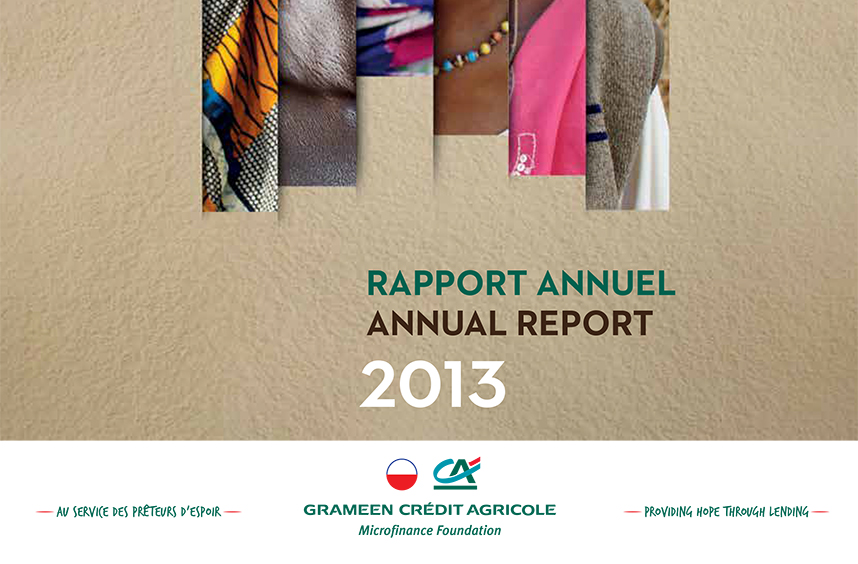
2013 Annual Report
As the 2015 deadline for reaching the Millennium Development Goals (MDGs) approaches, estimates produced by the World Bank confirm that the objective of reducing poverty by half was reached 5 years before the end of 2015: in developing countries, 47% of the population lived on less than $ 1.25 a day in 1990, in 2010 this rate dropped to 22%.
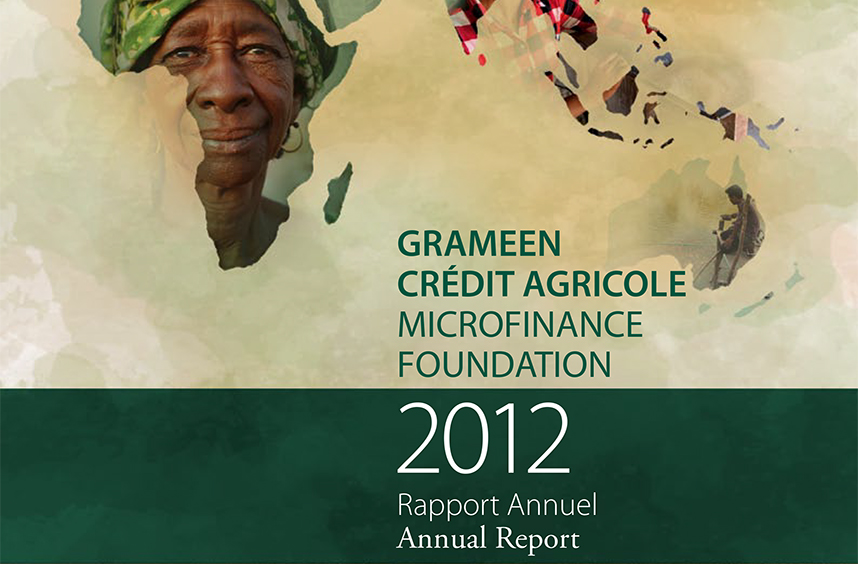
2012 Annual Report
After a period of rapid growth until 2010, microfinance today seems to be stalling. The study by the Global Microcredit Summit Campaign reveals that the number of people receiving microcredit around the world fell for the first time in 2011, from 205 million in 2010 to 195 million in 2011.
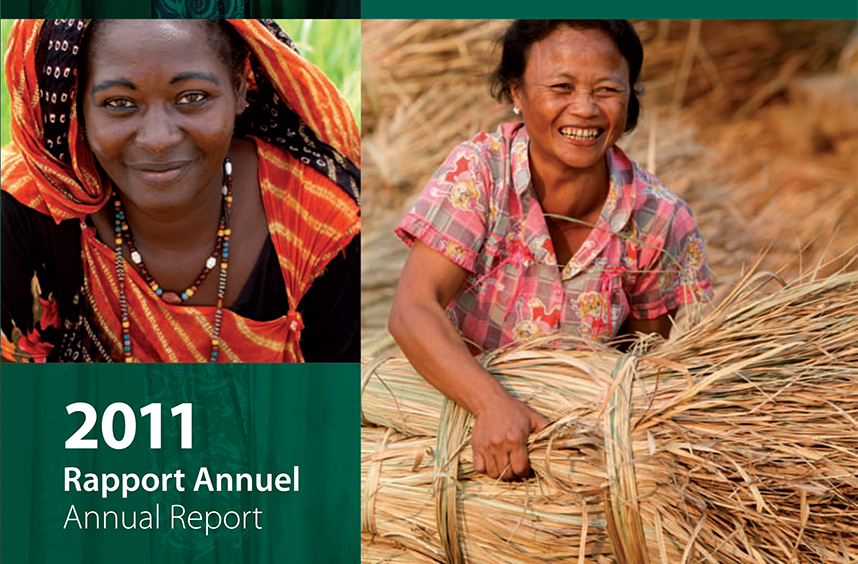
2011 Annual Report
The year 2011 will have been characterized by the rise of criticisms addressed to microfinance, accused of not respecting the social mission which had presided over its initial inspiration, even of resorting to interest rates and collection methods that only would not deny the loan sharks against which it claims to fight.
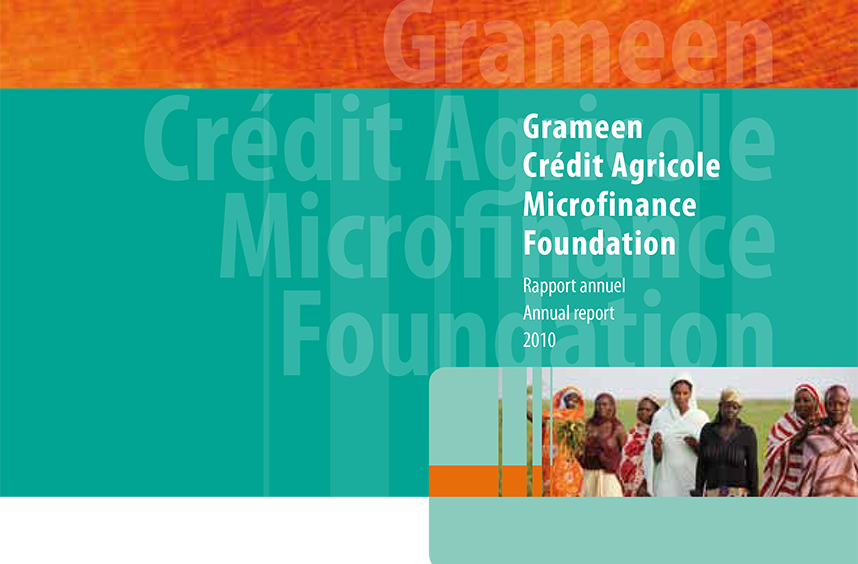
2010 Annual Report
According to the most recent figures from the Microcredit Summit Campaign1, 190 million borrowers benefit from microcredit. Among these borrowers, 128 million were below the poverty line at the time of their first microcredit and more than 80% of these poor borrowers are women.
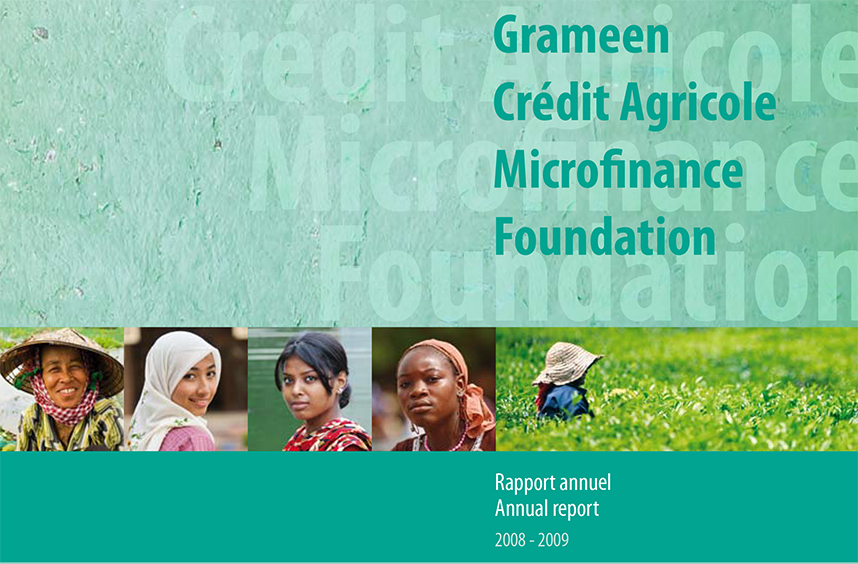
2009 Annual Report
It is a great honor and a great pleasure for me to present the first annual report of our Grameen Crédit Agricole Foundation, born of the common will of Professor Yunus, founder of Grameen Bank, Nobel Peace Prize 2006, and the leaders of the Crédit Agricole Group. This common will is anchored in a foundation of shared values between Grameen, a pioneer in microcredit, and Crédit Agricole, born in the 19th century from the peasant cooperative movement.
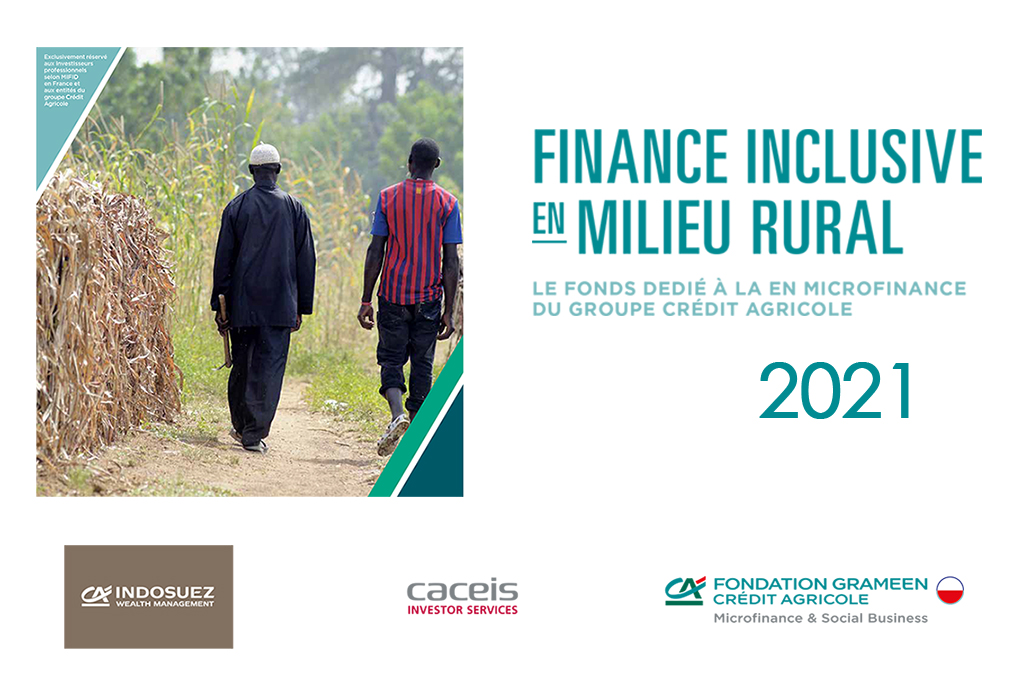
2021 Annual FIR Report
Le FIR, exclusivement réservé aux entités du groupe Crédit Agricole, permet d’investir dans le financement des institutions de microfinance rurales qui servent des populations traditionnellement exclues du secteur bancaire dans les pays émergents. À ce jour, le FIR a enregistré les souscriptions de 21 Caisses régionales, d’Amundi et de CA Assurances.
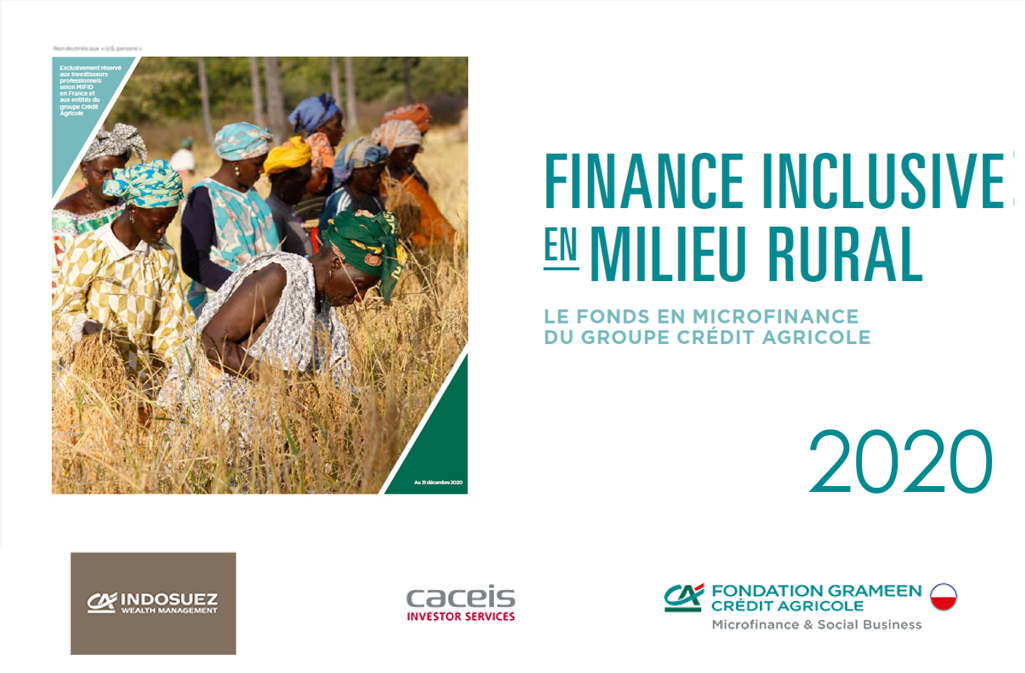
2020 Annual FIR Report
Au 31 décembre 2020, le FIR enregistre des souscriptions de 21 Caisses régionales, Amundi et CA Assurances pour un montant de 9,75 millions d'euros qui ont permis de soutenir 5 institutions de microfinance qui soutiennent près de 80 000 personnes à faibles revenus en Afrique, en Asie et en Europe. En 2020, avec la crise Covid-19, un suivi rapproché a été effectué auprès des organisations financées par le FIR pour adapter le soutien à chaque organisation.

2019 Annual FIR Report
Le Fonds pour la Finance Inclusive en milieu Rural (FIR) offre la possibilité aux Caisses Régionales et aux entités du groupe Crédit Agricole d’investir dans le financement des institutions de microfinance qui opèrent en milieu rural dans les pays émergents. Le groupe Crédit Agricole renforce ainsi son soutien aux institutions qui financent des activités génératrices de revenus au profit des populations rurales traditionnellement exclues du secteur bancaire.
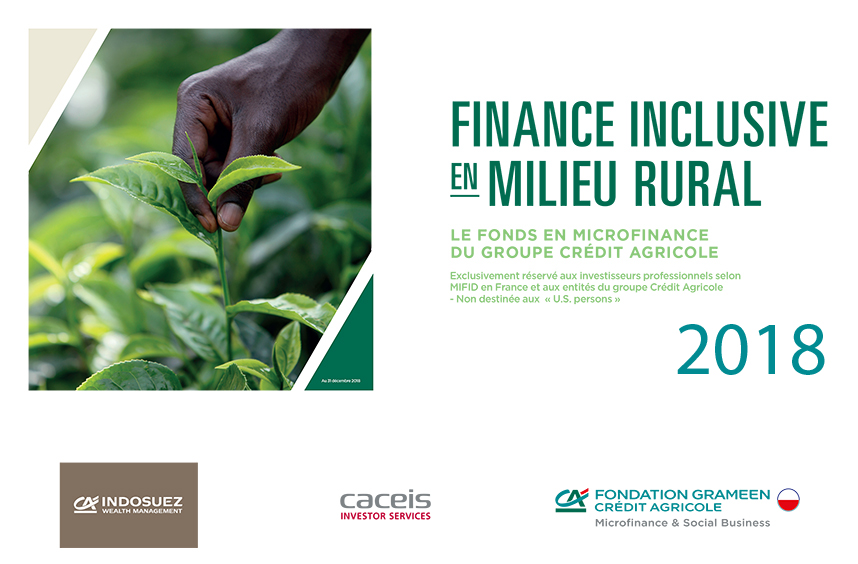
2018 Annual FIR Report
Lancé par la Fondation GCA, CA Indosuez Wealth (Asset Management) et CACEIS Bank Luxembourg Branch, le Fonds pour la Finance Inclusive en milieu Rural (FIR) vise à soutenir les institutions de microfinance en zones rurales qui servent des populations traditionnellement exclues du secteur bancaire. FIR vise une rentabilité positive pour les investisseurs ainsi qu’un impact social positif avec le financement d’activités génératrices de revenus pour les bénéficiaires des microcrédits.
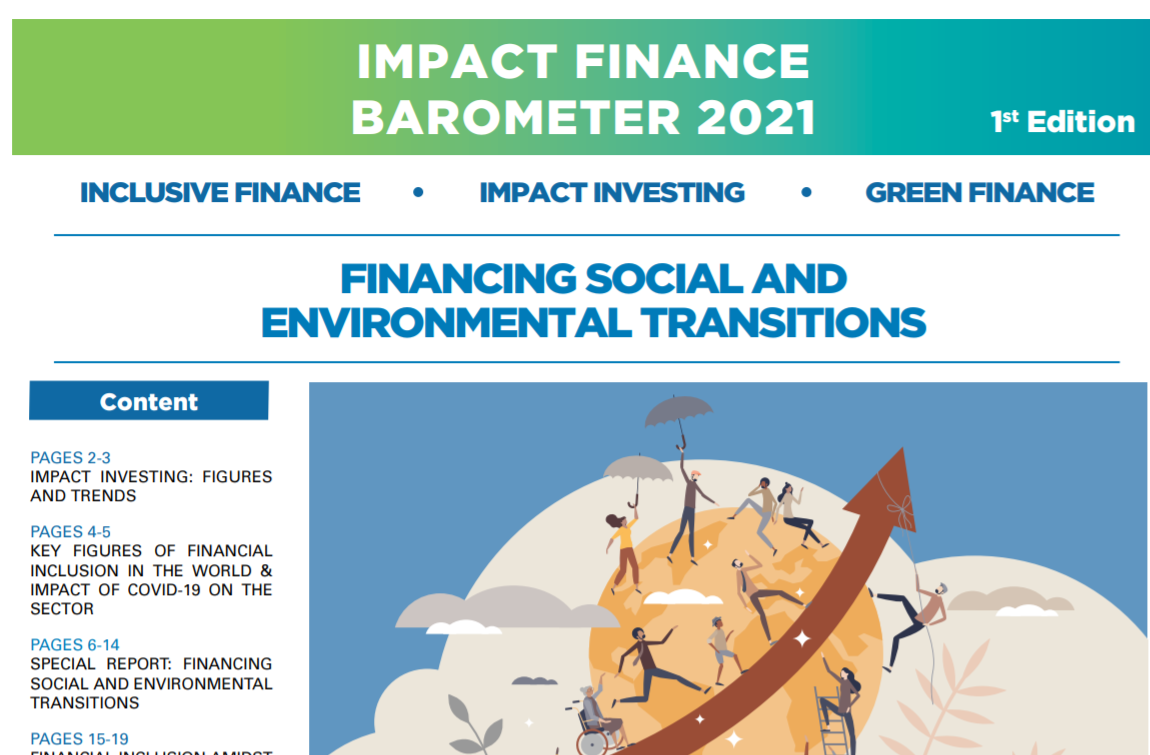
Impact Finance Barometer 2021
The first edition of the Impact Finance Barometer on the theme "financing social and environmental transitions" presents the key figures of the sector and the levers for the development of inclusive finance at the service of populations and the environment.
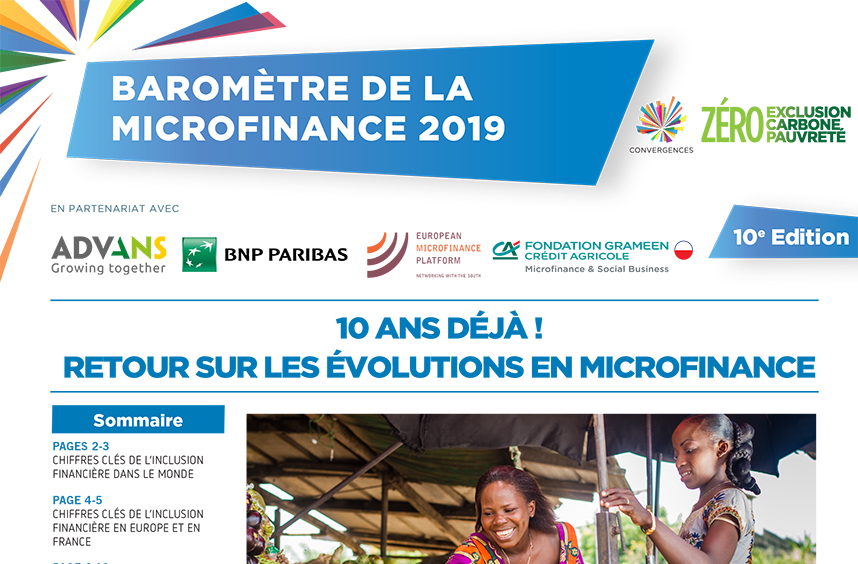
Microfinance Barometer 2019
Despite its good results in recent years, microfinance sometimes appears to be misunderstood or misunderstood by part of public opinion. Today, for its 10th anniversary, the Microfinance Barometer (BMF) proposes to consider microfinance as a fully-fledged dimension of development policies and as a pioneering sector of responsible finance. In order to identify its challenges, let's shed light on its history.
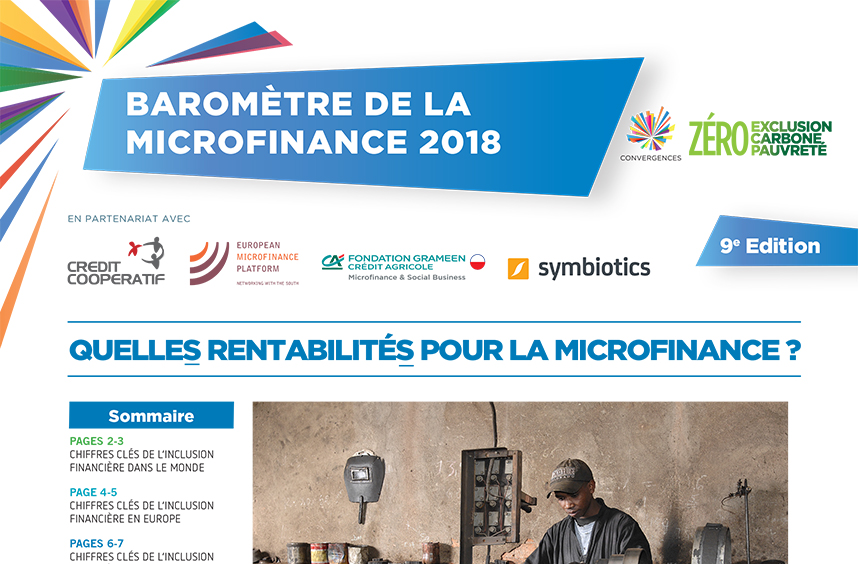
Microfinance Barometer 2018
Profitability: essential for microfinance, this concept is nevertheless complex to grasp in a sector which has the raison d'être of social impact. Should microfinance be profitable? If so, can it be by remaining socially responsible? Can it stay true to its aspirations and contribute, through financial inclusion, to the exit of poverty of almost 2 billion people who do not have access to banking services?
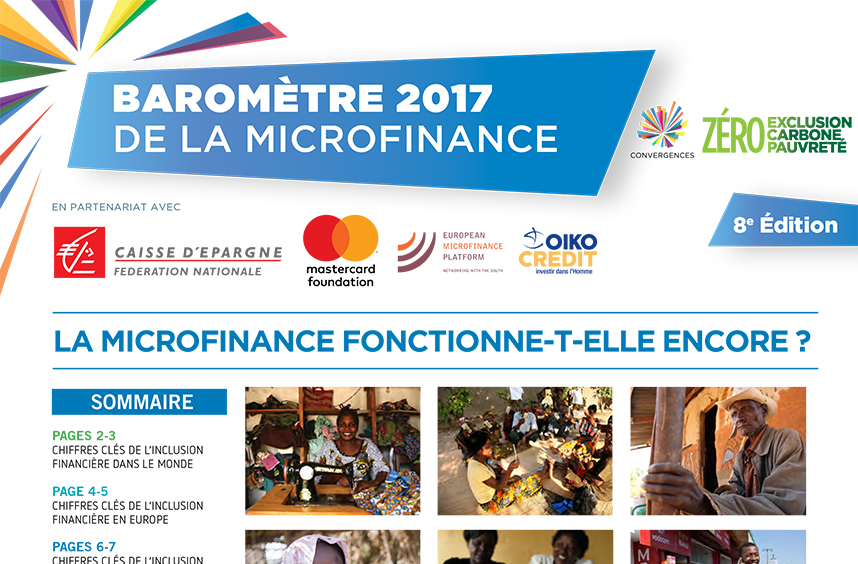
Microfinance Barometer 2017
Difficult to account for the state of microfinance in the world, as the specialized institutions are diverse in their legal nature, their size, their offer of services, their business model and the context in which they operate.
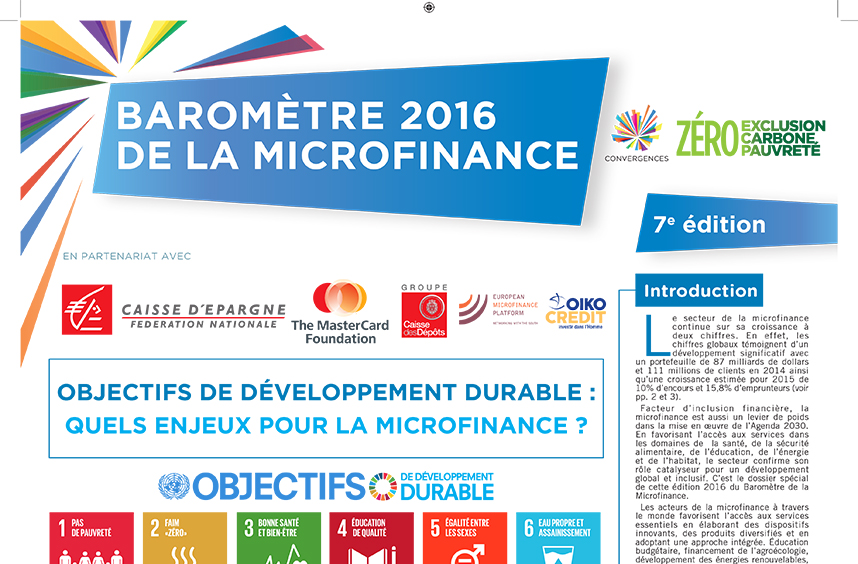
Microfinance Barometer 2016
The microfinance sector continues to grow in double digits. In fact, the global figures show significant development with a portfolio of $ 87 billion and 111 million customers in 2014, as well as an estimated growth for 2015 of 10% in outstandings and 15.8% in borrowers.
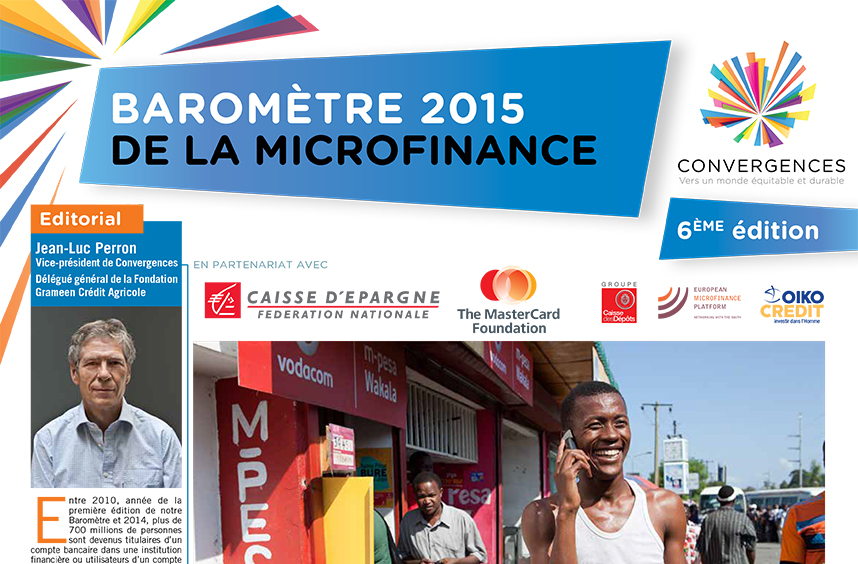
Microfinance Barometer 2015
Between 2010, the year of the first edition of our Barometer and 2014, more than 700 million people became holders of a bank account in a financial institution or users of a mobile money account, reducing the number of adults unbanked at 2 billion today. This is shown in the new World Bank Global Findex study, published in April 2015.
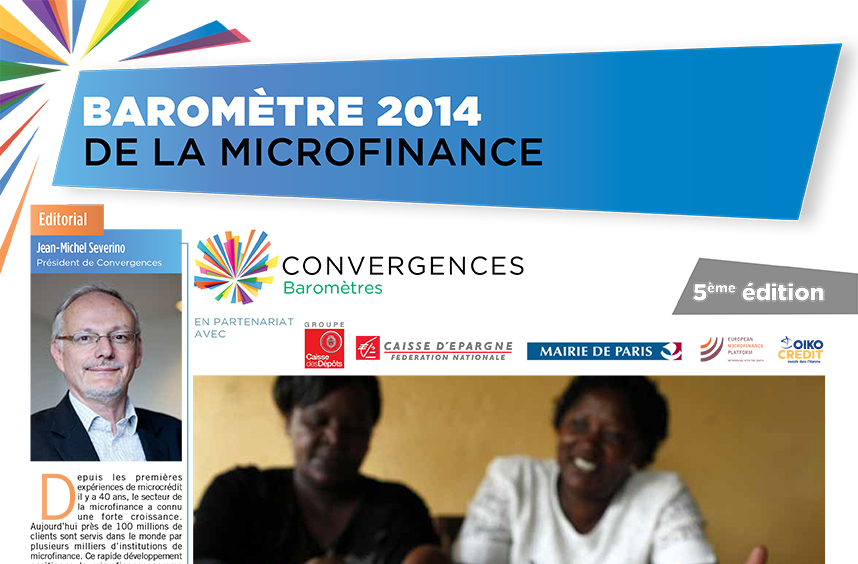
Microfinance Barometer 2014
Since the first microcredit experiences 40 years ago, the microfinance sector has experienced strong growth. Today, almost 100 million clients are served worldwide by several thousand microfinance institutions. This rapid development positions microfinance as a major instrument for financial inclusion, even if the sector has experienced crises that call for the implementation of more responsible economic models to ensure the sustainability of its mission.

Microfinance Barometer 2013
About one fifth of the world's population lives in poverty. The countdown to the achievement of the Millennium Development Goals (MDGs) has started, and discussions on the post-2015 agenda are the subject of consultations worldwide. In this context, reflecting on the potential of microfinance is particularly timely.
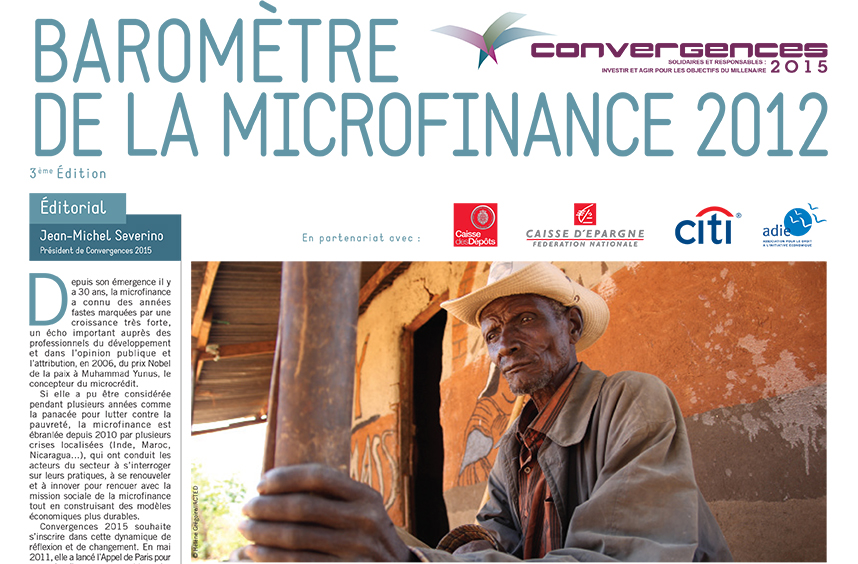
Microfinance Barometer 2012
Since its emergence 30 years ago, microfinance has known boom years marked by very strong growth, an important echo among development professionals and in public opinion and the awarding, in 2006, of the Nobel Prize for peace to Muhammad Yunus, the designer of microcredit.
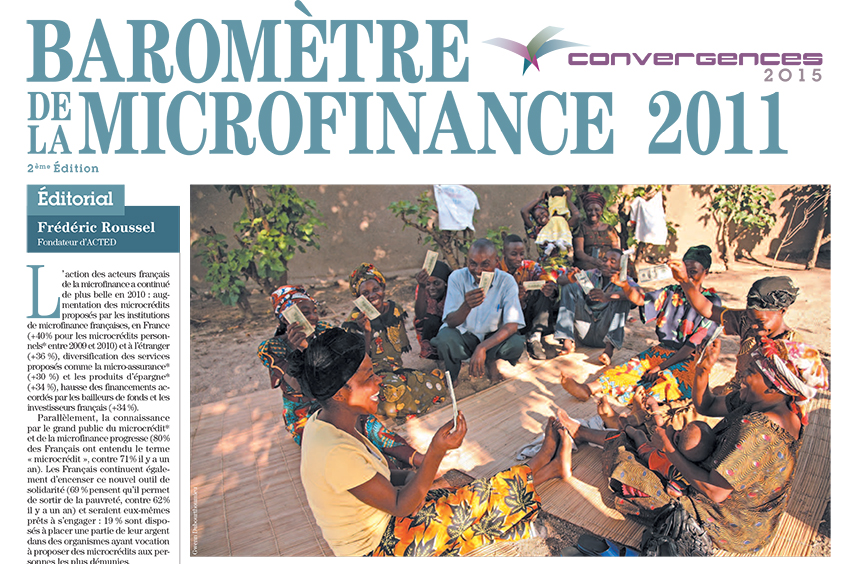
Microfinance Barometer 2011
The action of French microfinance players continued even better in 2010: increase in microcredits offered by French microfinance institutions, in France (+ 40% for personal microcredits between 2009 and 2010) and abroad (+ 36%), diversification of the services offered such as microinsurance (+30%) and savings products (+34%), increase in funding from French donors and investors (+34%).
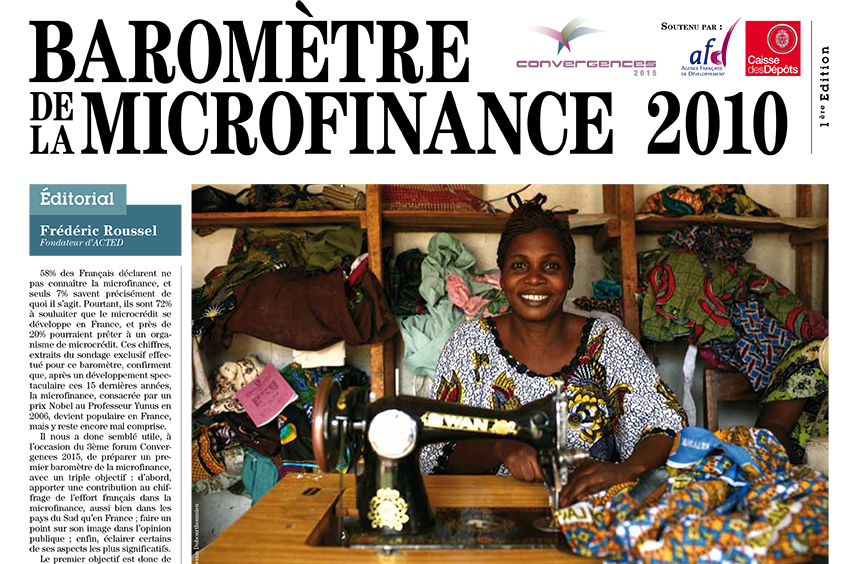
2010 Microfinance Barometer
Microfinance is the means to put financial systems at the service of the poor who do not have access to conventional financial institutions. The poor make up the vast majority of the population in most developing countries.
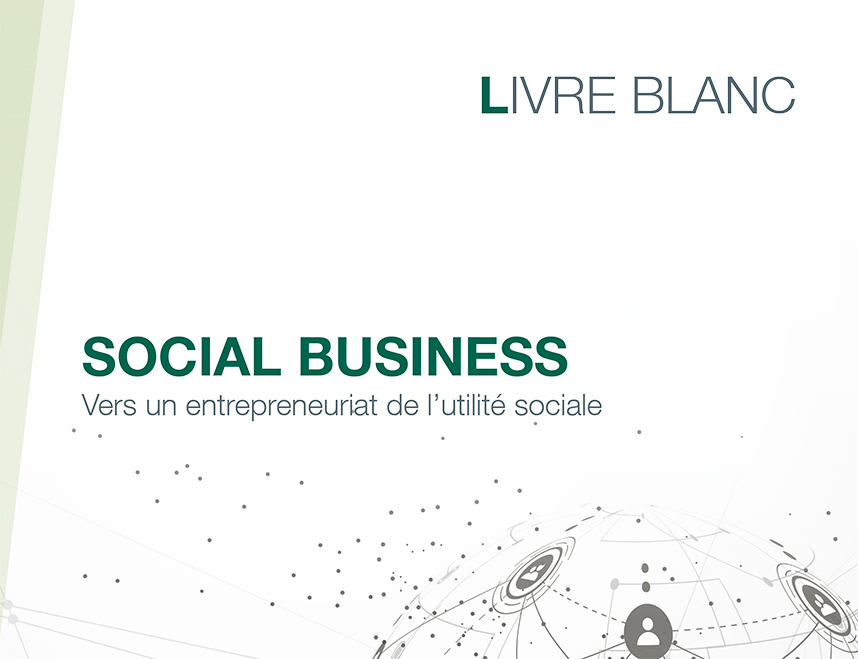
Social Business White Paper
The Foundation has published "Social business, the path to entrepreneurship for the common good”, which draws lessons from its eight years of investing in social businesses. This White Paper highlights many hurdles to overcome and puts forward seven concrete proposals to improve the efficiency of social business. The Foundation presents a unique economic approach, from identifying success factors to structuring the social performance of projects.
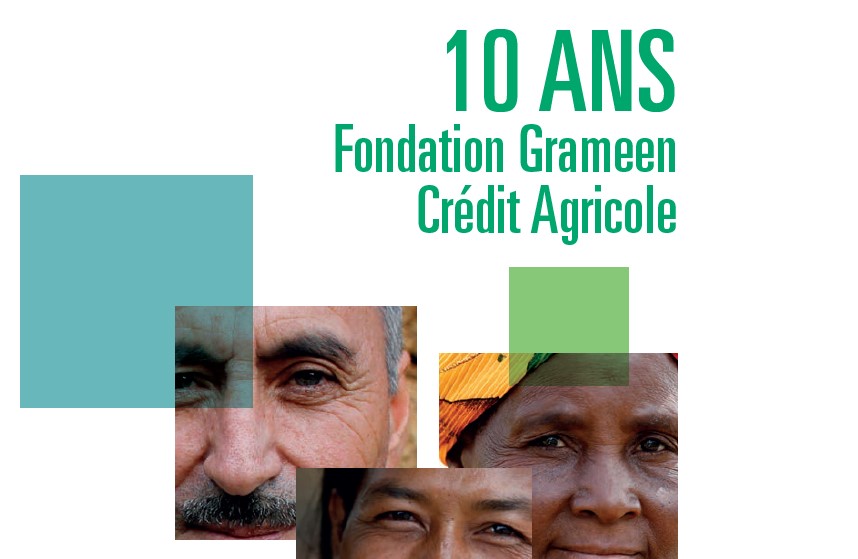
10th Anniversary Booklet
10 years ago, the Foundation was founded by Crédit Agricole and Pr. Yunus, the precursor of microfinance and Nobel Peace Prize laureate. 10 years ago, alongside actors who work every day on the ground, the Foundation committed to contribute to build a better-shared economy. The Foundaiton's anniversary reminds everyone of the drivers behind its commitment: not to fear any challenge, not to neglect any territory and never to abandon anyone along the way.
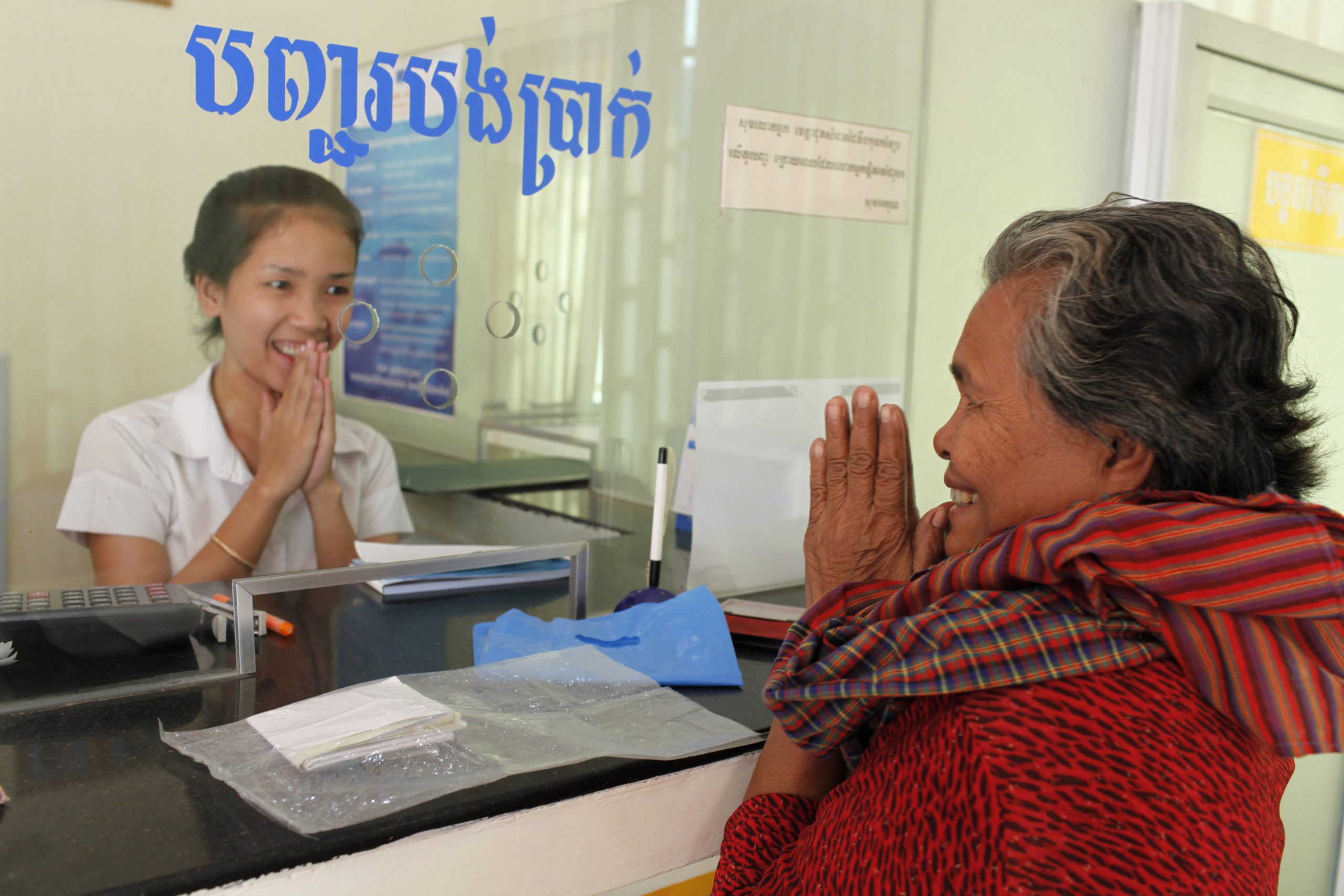
Principles to protect MFIs and clients in COVID-19 crisis
While the COVID-19 sanitary crisis is in full swing, a group of Microfinance Investment Vehicles (VIM) and microfinance stakeholders met in April 2020, at the initiative of the Grameen Crédit Agricole Foundation, to exchange their points of view on the situation and draft a common commitment to guide their response to the crisis in a responsible and concerted manner.
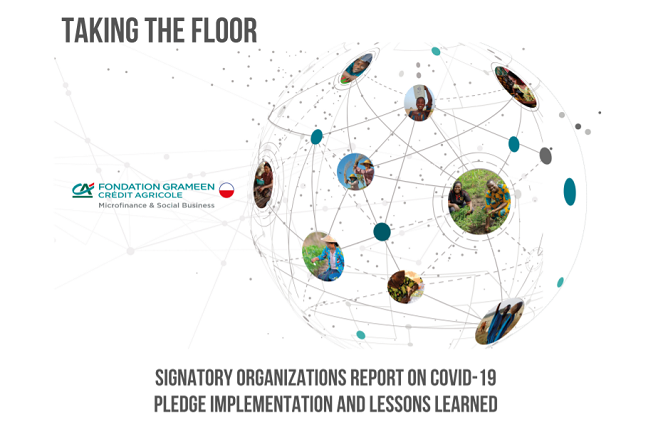
Signatory organizations report on Covid-19 pledge implementation and lessons learned
The Foundation has published "Signatory organizations report on Covid-19 pledge implementation and lessons learned". By signing the Covid-19 Commitment on Key Principles to Protect Microfinance Institutions (MFIs) and their Clients from the Covid-19 Pandemic (the Commitment), 30 signatories have committed to 10 key principles. Six months after the signing of the Commitment, a working group of 7 of its signatories is drawing lessons learned from the implementation of its principles. How have they been applied? What were the main challenges faced? What lessons can already be learned to better address the pandemic and live up to our commitment in the months ahead?
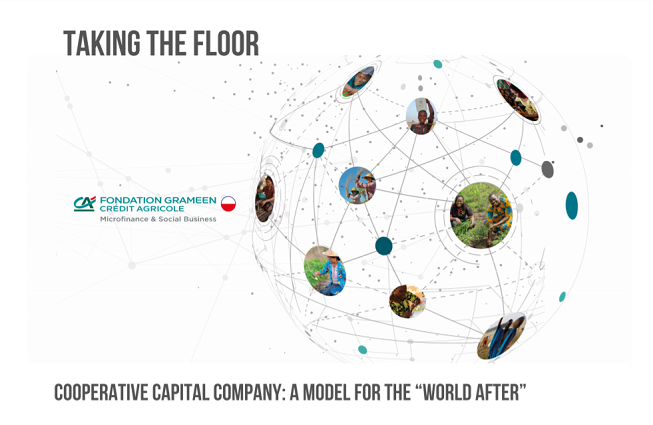
Cooperative capital company: a model for the “world after”
The Foundation has published "Cooperative capital company: a model for the “world after”", an op-ed piece written by Eric Campos and Bagoré Bathily that puts forward the idea of a socially different model of enterprise: the cooperative-capital enterprise. The global shock of 2020 shows the absolute necessity to rethink our economic system.
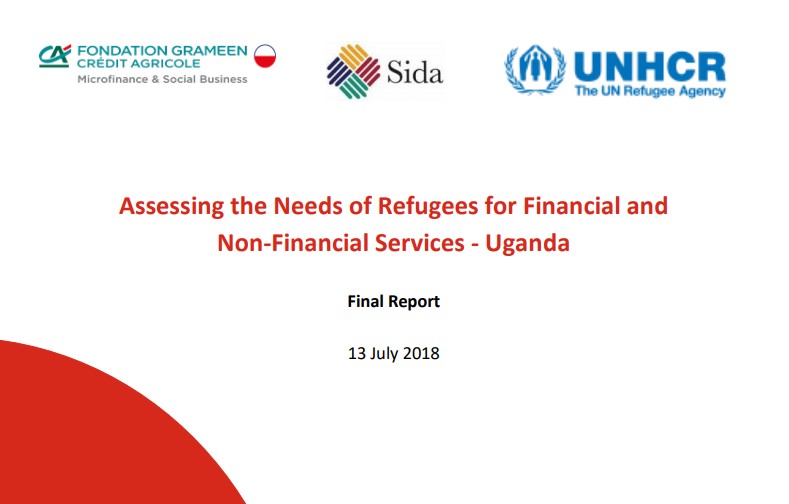
GCAF Refugee market assessment Jordan
The Swedish International Development Cooperation Agency (Sida) is a government agency working on
behalf of the Swedish parliament and government, with the mission to reduce poverty in the world.
Through its work and in cooperation with others, Sida contributes to implementing Sweden’s Policy for
Global Development. The goal of Sweden's international aid work is to improve the living conditions of
people living in poverty and under oppression. Sida’s work is governed by the annual appropriations and
the strategies for development co-operation with countries, regions and themes designated by the Swedish
government. Sida decides over about half of the Swedish foreign aid.
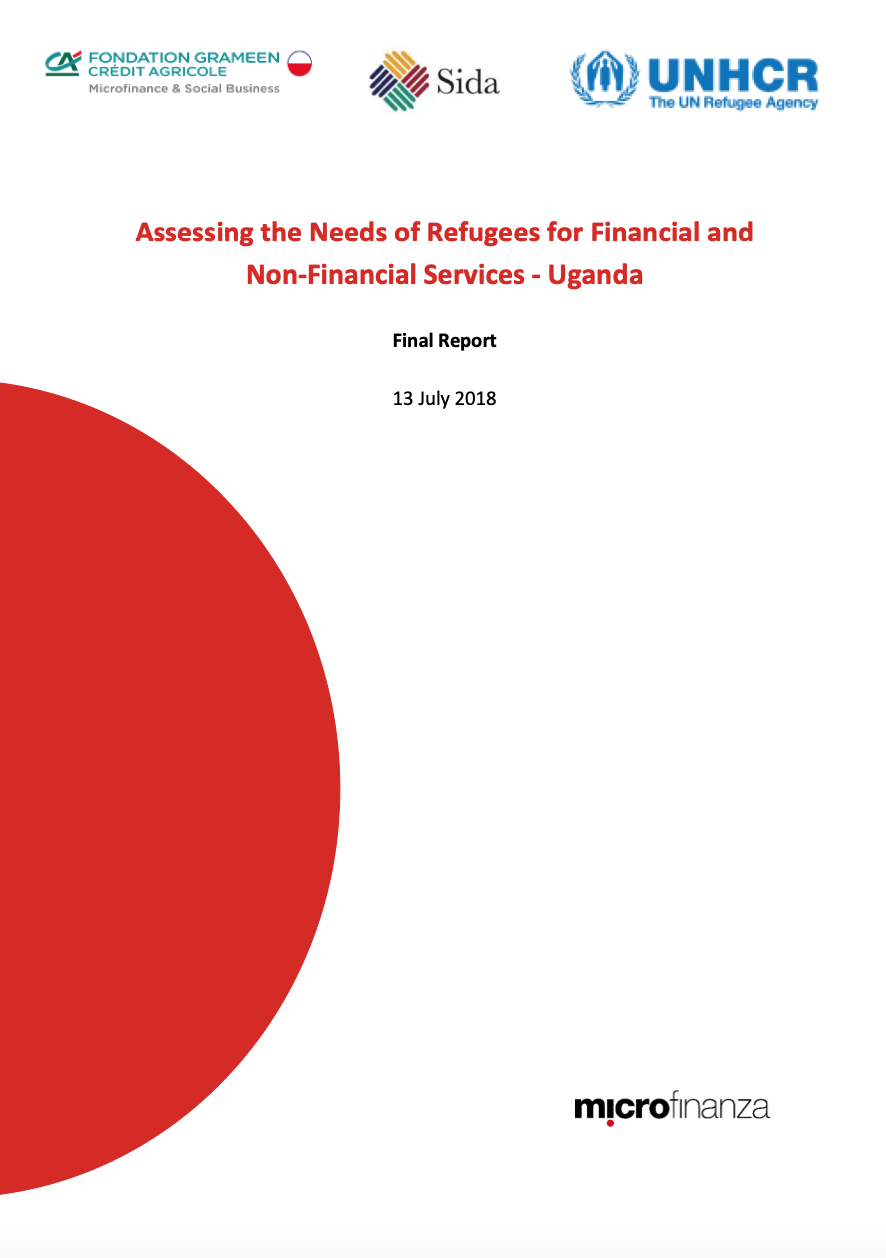
GCAF Refugee market assessment Ouganda
Initiated in 2008 by the Groupe Crédit Agricole, in partnership with Prof. Muhammad Yunus, Founder of the
Grameen Bank and Peace Nobel Price 2006, the Grameen Crédit Agricole Foundation (GCAF) aims at
contributing to the fight against poverty in developing countries by financing microfinance institutions and
social business enterprises. It provides loans, equity, guaranties and technical assistance to its partners.
Initially the Foundation received an endowment of 50 million euros. Currently the Foundation works with
70 partners in 33 countries.
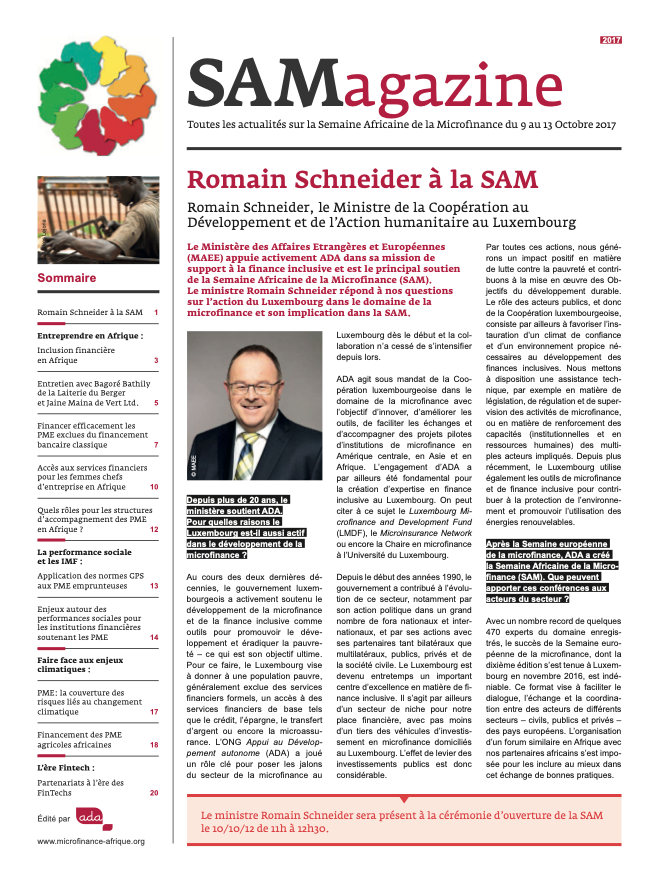
SAM Magazine 2017
The Ministry of Foreign and European Affairs (MAEE) actively supports ADA in its mission to support inclusive finance and is the main supporter of the African Microfinance Week (SAM). Minister Romain Schneider answers our questions on Luxembourg’s action in the field of microfinance and its involvement in SAM.
